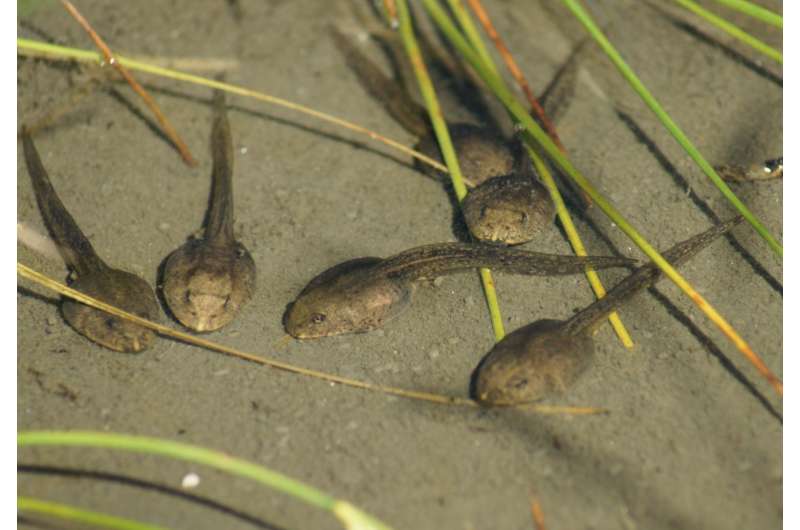Tadpoles. Credit: Wikipedia/böhringer friedrich
An international team of researchers has confirmed a severe perkinsea infection (SPI) in captive frogs in the U.K. In their paper published in the journal Biology Letters, the researchers describe the circumstances surrounding the infection found in the U.K. and testing they conducted of frogs in the wild in Panama.
Over the past few decades, populations of frogs and other amphibians has been declining at a rapid pace. So rapid, in fact, that scientists estimate a third of all amphibian species are at risk of extinction. Prior research has suggested that the decline is due to disease-causing microbes and loss of habitat. Some of the deaths have been attributed to frogs from one part of the world coming into contact with frogs in other parts of the world. Prior research has also shown that one type of microbe is responsible for SPI in tadpoles—a pathogenic perkinsea clade. SPI, which was first observed in tadpoles in New Hampshire in 1999, leads to bloating in the liver leaving the tadpole unable to dive in water. Mortality rates for infected areas approach 95%. In recent years, infections have been seen all across North America.
In this new effort, the researchers responded to a report by a non-scientist frog enthusiast who had purchased some European tree frog tadpoles at a pet store in Surry. The source of the tadpoles was not known, but testing showed them to be carrying SPI. The finding marks the first known instance of an SPI infection in the UK or Europe.
The researchers also ventured to Panama to investigate reports of an outbreak of SPI in the wild. They captured 81 tadpoles at the site and found that ten of them tested positive for SPI. They suggest the two findings indicate that SPI is at the stage of spreading to other parts of the world, and because of that, they are calling for screening of amphibians that are traded internationally. They note that such trade is quite large—some in the field have estimated that $100 million is spent each year on frogs meant to be eaten. Meanwhile, they are also asking for people in the U.K. who have frogs to keep them indoors.
More information: Vanessa Smilansky et al, Expanded host and geographic range of tadpole associations with the Severe Perkinsea Infection group, Biology Letters (2021). DOI: 10.1098/rsbl.2021.0166
Journal information: Biology Letters
© 2021 Science X Network
























